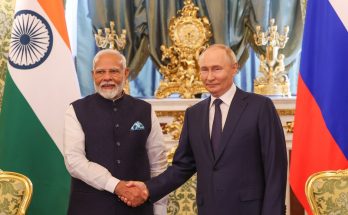SINGAPORE: Underlining the US’ enduring commitment to shape a free and open Indo-Pacific region to avert domination attempts by any one nation, US acting Secretary of Defence Patrick Shanahan warned against “behaviour that erodes other nations’ sovereignty and sows distrust of China’s intentions.”
In a veiled swipe at China, he drew the world’s attention to a “toolkit of coercion” that was manifested in a range of behaviours and activities throughout the Indo-Pacific.
“I am here to affirm the United States’ enduring commitment to the Indo-Pacific region and to the values that keep it secure and prosperous, free and open,” he said at a much-awaited speech at the Shangri-La Dialogue in Singapore on June 1.
“The Indo-Pacific is our priority theatre. We are where we belong,” he said at the annual meeting of defence ministers, military officials and security experts in Singapore.
“Our shared geography has spurred the integration and linkage of our economies: America’s annual two-way trade here is US$2.3 trillion (S$3.2 trillion), and US foreign direct investment is US$1.3 trillion, more than China’s, Japan’s and South Korea’s combined,” he said.
Sovereignty Issues

 In a speech that was replete with veiled reference to China’s allegedly disruptive behaviour in the region, Mr Shanahan stressed that China can and should have a cooperative relationship with the rest of the region. “But behaviour that erodes other nations’ sovereignty, and sows distrust of China’s intentions must end,” he said.
In a speech that was replete with veiled reference to China’s allegedly disruptive behaviour in the region, Mr Shanahan stressed that China can and should have a cooperative relationship with the rest of the region. “But behaviour that erodes other nations’ sovereignty, and sows distrust of China’s intentions must end,” he said.
“Until it does, we stand against a myopic, narrow, and parochial vision of the future, and we stand for the free and open order that has benefited us all – including China,” he said.
In a speech that was widely seen as being soft on China despite the escalating US-China trade war, Mr Shanahan repeatedly stressed on the imperative to adhere to international rules and norms. “Some in our region are choosing to act contrary to the principles and norms that have benefited us all,” he said.
Without naming China, Mr Shanahan spoke about a “toolkit of coercion” that was manifested in a range of behaviours and activities throughout the Indo-Pacific. These included militarising disputed areas, threatening the use of force to compel rivals into conceding claims, using influence operations to interfere in the domestic politics of other nations and undermining the integrity of elections, he said.
“If the trends in these behaviours continue, artificial features in the global commons could become toll booths. Sovereignty could become the purview of the powerful,” he said in a veiled allusion to China’s reported attempts at militarising the South China Sea. He warned against attempts to restrict freedom of navigation and international overflight which could endanger peace and stability in the region.
Inclusive Indo-Pacific
Alluding to Chinese President Xi Jinping’s signature initiative, the Belt and Road Initiative (BRI), Mr Shanahan said: “Some seem to want a future where power determines place and debt determines destiny,” he said. This, the acting US defence secretary said, includes the Better Utilisation of Investment Leading to Development, or the Build Act, enacted by Congress last year through which up to US$60 billion will be channelled into transparent and privately-driven projects.
“We know the inter-dependence of security and economics, that economic security is national security. That’s why we want the Indo-Pacific to remain free and open,” he said.
Underlining the US’ vision of the Indo-Pacific, he spoke about pursuing an inclusive and enduring approach. “This is not new nor exclusively an American vision; this is an inclusive and enduring approach, embraced by almost all of us who call the Indo-Pacific home,” he said.
Highlighting the centrality of ASEAN in the US’ vision of the Indo-Pacific, Mr Shanahan said: “Nations are empowered through their relationship with the US and others in this common bond. They remain free to choose their destiny, as strategic partners, exercising strategic independence.”
China’s Defence Minister and State Councilor Gen. Wei Fenghe is expected to respond to these allegations and present Beijing’s vision of the Indo-Pacific at the Shangri-La Dialogue on June 2.
Author Profile

- Manish Chand is Founder-CEO and Editor-in-Chief of India Writes Network (www.indiawrites.org) and India and World, a pioneering magazine focused on international affairs. He is CEO/Director of TGII Media Private Limited, an India-based media, publishing, research and consultancy company.
Latest entries
 India and the WorldJuly 9, 2024Defying West, India sets $100 billion trade target with Russia
India and the WorldJuly 9, 2024Defying West, India sets $100 billion trade target with Russia India and the WorldJuly 5, 2024India at SCO: Takes swipe at Pakistan for cross-border terror, pushes alternative to BRI
India and the WorldJuly 5, 2024India at SCO: Takes swipe at Pakistan for cross-border terror, pushes alternative to BRI India and the WorldJune 14, 2024Modi’s Day 1 in Italy: Bonding with Britain, France
India and the WorldJune 14, 2024Modi’s Day 1 in Italy: Bonding with Britain, France India and the WorldJune 13, 2024G7 summit in Italy: Modi to showcase India as leader of Global South
India and the WorldJune 13, 2024G7 summit in Italy: Modi to showcase India as leader of Global South






